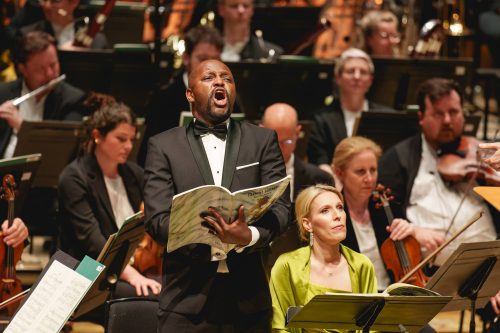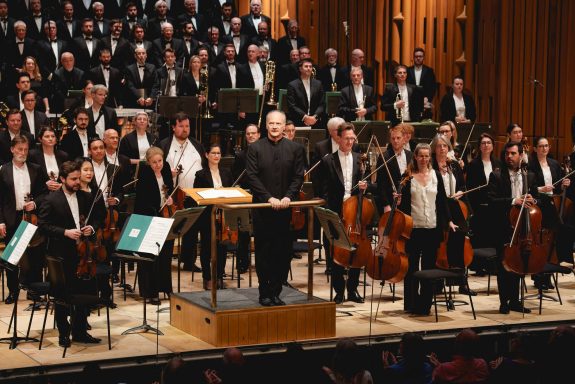 United Kingdom Shostakovich, Orff: Christina Poulitsi (soprano), Sunnyboy Dladla (tenor), Elliot Madore (baritone), Tiffin Boys Choir, London Symphony Chorus (chorus director: Mariana Rosas), London Symphony Orchestra / Gianandrea Noseda (conductor). Barbican Hall, London 25.6.2024. (JR)
United Kingdom Shostakovich, Orff: Christina Poulitsi (soprano), Sunnyboy Dladla (tenor), Elliot Madore (baritone), Tiffin Boys Choir, London Symphony Chorus (chorus director: Mariana Rosas), London Symphony Orchestra / Gianandrea Noseda (conductor). Barbican Hall, London 25.6.2024. (JR)

Shostakovich – Symphony No.3, Op.20
Orff – Carmina Burana
Gianandrea Noseda is working his way through Shostakovich’s fifteen symphonies for a cycle released on LSO Live. So far, he has recorded numbers 1,4,5,6,7,8,9,10 and 15. At this concert, it was the time to perform Shostakovich’s Third, not one that most music lovers outside Russia know. Even in Russia it disappeared from the repertoire for 35 years. Noseda admitted to the orchestra in rehearsal that he had never conducted the work nor heard it in performance. An old Russian friend in the audience told me after the performance that it had been an excellent performance of a work with little merit, which just about sums it up.
One needs to know the background of the piece to make a fairer assessment. Shostakovich was 23 and still a postgraduate student at the Leningrad Conservatoire. His First Symphony had been a success, and he was now ready to embrace avant-garde experimentalism, which he did in his now rarely performed Second Symphony. His Third Symphony celebrates the official State holiday of the First of May, is in one movement, and uses a chorus in the closing section, singing ideological texts. It is a festive salute and was met with Soviet approval, though there are touches of trademark Shostakovich irony in the piece. The work is one of continual contrast as the composer wanted to try to write a symphony where not one theme repeats itself. I am not convinced the experiment succeeded. There is some brass band music and the whole work is like a grand parade with the workers bringing up the rear.
Noseda put his usual frenetic energy into the piece but despite, or perhaps because of plenty of decibels, the work failed to convince in any way. I highlight the two clarinettists, Sérgio Pires and Chi-Yu Mo for their mellifluous opening of the work. The London Symphony Chorus sang with gusto, particularly admirable as they still had a Carmina Burana to go in the second half of the concert.
Carmina Burana does not appeal to everyone. Some find it too banal; some now find the content too incorrect, others are swayed by its rhythmic swagger. It usually fills a hall although England were playing in the Euros the same evening which might account for a few of the empty seats.
Greek soprano Christina Poulitsi was spectacular: she has sung the Queen of the Night in 17 different productions and in 270 performances, so there is no denying that she can hit the top notes. Orff wrote challenging parts for each soloist and Poulitsi was on form. South African tenor Sunnyboy Dladla, as the roasted swan, has little to sing but shone out. Usually his role is sung in a strangulated falsetto, but this was a full force cry which impressed. Canadian baritone Elliot Madore was most affecting in his low and middle ranges but struggled at the top, his falsetto almost inaudible, despite having a winning stage manner.
The chorus were the stars of the show: excellent intonation, especially the first sopranos. Diction was crisp and clear; at times I would have liked to see more wild abandon to go with the faster sections of the music. The Tiffin Boys did their stuff perfectly.

Noseda took a fast pace whenever possible which the choir and orchestra took in their stride. Noseda missed a repeat which caused confusion: Noseda apologised to the audience for his oversight. Particularly fine contributions came from the flautist Gareth Davies and the splendid timpanist Nigel Thomas.
The concert was a fittingly large-scale conclusion to the LSO’s season. Over the summer they will make several appearances with their new Chief Conductor Sir Antonio Pappano in the UK and abroad, in Snape, Warsaw, Ljubljana and Gstaad, and Britten’s War Requiem at the BBC Proms.
John Rhodes